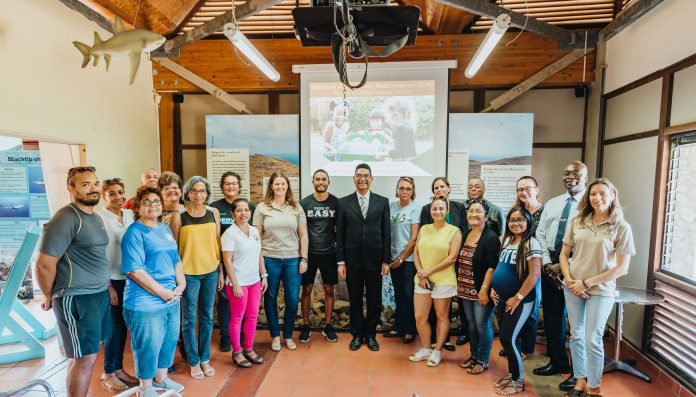The Minister of Education, Science and Sustainable Development (OWDO), Dr. Armando R. Lampe, in his vision as Minister of Education, is introducing the supplementary Nature and Environmental Education (in Dutch: Natuur- en Milieu Educatie or NME) into the Aruban primary school curriculum in 2020/2021. The overriding goal of NME is to bring children closer to nature through a more pragmatic and practical approach.
The Aruban curriculum already teaches the subject Kennis der Natuur (Knowledge of Nature) as part of the World Orientation program. NME will supplement this with a more hands-on approach that easily translates into our daily lives. NME encourages pupils to carefully consider nature, hygiene, their living environment, Aruban flora and fauna, and especially encourages sustainable and responsible thinking and behavior at a young age with regard to a healthy lifestyle and caring for nature and the environment. Drs. Samuel Dumfries of the Directorate of Education Aruba (DEA) has been appointed as project leader to develop and run the pilot together with the specialists of the Aruba National Park Foundation (Fundacion Parke Nacional Aruba or FPNA) during the 2019/2020 school year. Four different primary schools will participate in this pilot project.
Becoming aware of the fact that nature and our environment are inextricably linked to who we are as human beings is a first step in solution-based thinking. Our knowledge of and interaction with nature is (partly) dependent on what we are taught from home, but also during our school career. We live in a complex world with a multitude of perspectives from which to choose. In addition to increasing complexity and versatility in information flows and choices, the effects of our choices have also become more complex and extensive.
NME encourages pupils to think and act in critical, creative and solution-focused ways, thereby providing more breadth and depth to the national curriculum. NME is available from kindergarten. Hence, nature and environmental awareness is stimulated and imparted at a young age and throughout primary school.
The NME pilot project covers three themes: Waste, Healthy Lifestyle and Flora & Fauna. The first theme, Waste (with the lesson title Aruba Dushi Sin Sushi or ‘Aruba Lovely without Waste), was introduced to the participating teachers last Friday during a workshop at the Arikok National Park. Waste is a broad concept, but what all types of waste have in common is that it is ultimately thrown away. Part of this is true waste; materials or items that can no longer be (re)used. Often there are also items that could be repaired, reused or recycled in some other way, such as paper, glass and tin cans. We humans produce a lot of waste. It is better for the environment (and also for animals and humans) if we become more aware of the forms of waste and how we can reduce waste at home, in our surroundings and at school.
Litter is found almost everywhere in Aruba. It is dumped along roadsides, on our school grounds, in our shopping centers, in our mondi, on our beaches and along our coasts. Everywhere you see chewing gum, bottles, straws, cigarette butts, cans, and more junk. We all think it is dirty and ugly. It is often dangerous too – for both people and animals and nature. The only way to do something about this problem is to change our own thinking and behavior. It is in our own hands to foster a clean and safe living environment. The overriding goal of the assignments in these themed practical lessons is to bring about desired behavioral change and encourage sustainable behavior of the pupils. Ultimately, we want to encourage a cleaner, safer and healthier living environment for everyone on Aruba. q




















